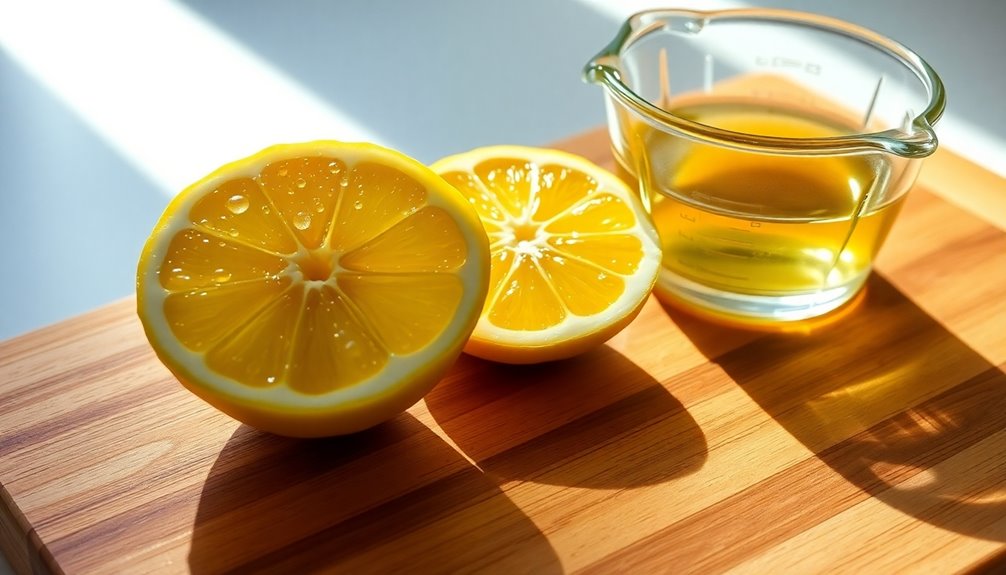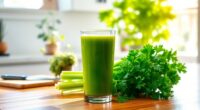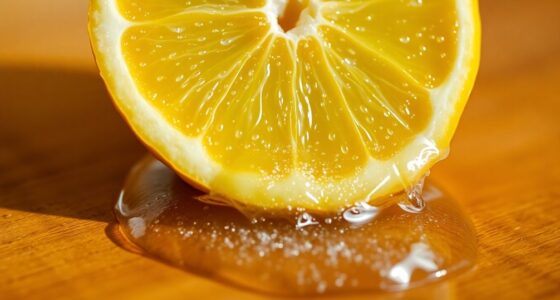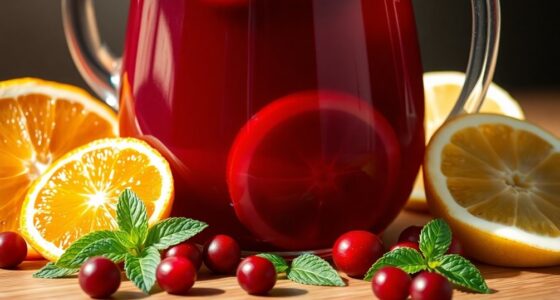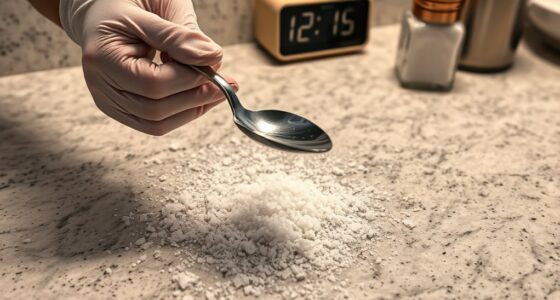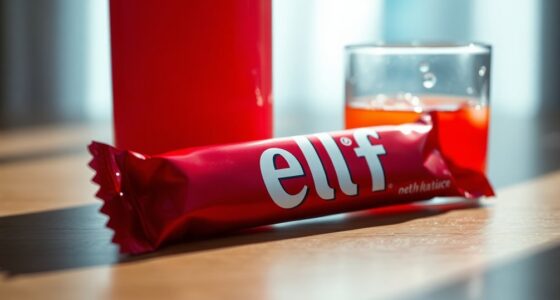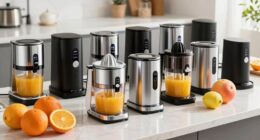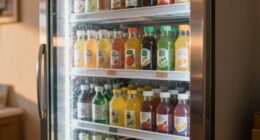A medium-sized lemon usually gives you about 2 to 3 tablespoons of juice. If you've got a large lemon on hand, you could squeeze out up to 4 tablespoons or even a quarter cup! Interestingly, smaller lemons can yield more juice relative to their size. The juiciness also varies based on ripeness and season. Knowing how much juice you can expect can help you plan your recipes better, and there's more to discover about maximizing your lemon's potential!
Key Takeaways
- A medium-sized lemon typically yields about 2 to 3 tablespoons of juice.
- A large lemon can produce up to 4 tablespoons, or a quarter cup, of juice.
- Smaller lemons may yield more juice relative to their size compared to larger ones.
- Seasonal factors, such as summer harvest, can affect the juiciness of lemons.
- Techniques like rolling lemons on the countertop can help maximize juice extraction.
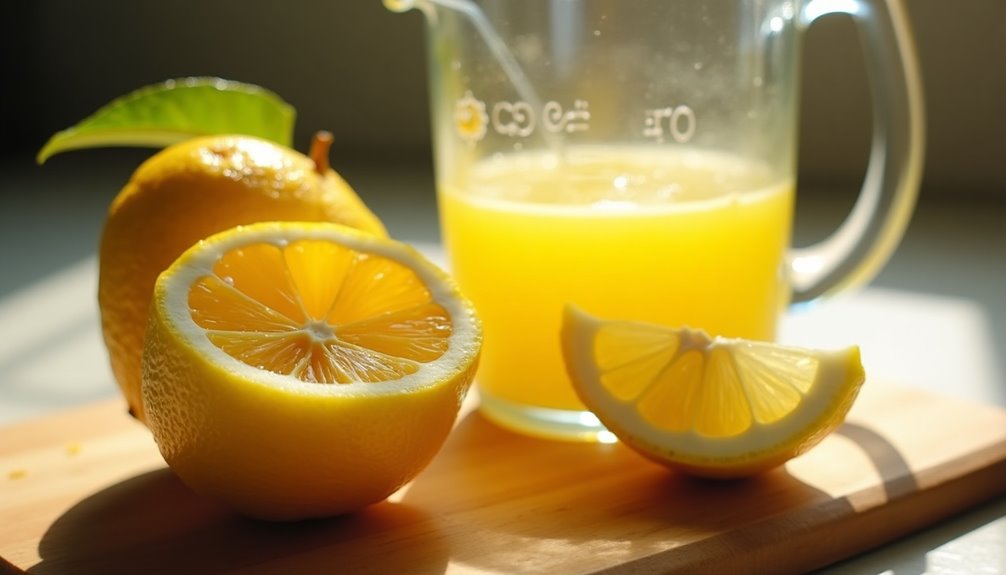
When you're wondering how much juice you'll get from one lemon, it can be helpful to know that a medium-sized lemon usually yields about 2 to 3 tablespoons. This amount is perfect for adding that zesty flavor to your dishes or drinks.
If you're using large lemons, you might be pleasantly surprised to find that they can produce up to 4 tablespoons, or a quarter cup, of juice. This means that when you're planning a recipe, the size of the lemon can significantly impact how much juice you end up with.
If you're aiming for a specific quantity of lemon juice, it's useful to know how many lemons you'll need. For example, if you want to get 1 cup of lemon juice, you'll need around 5.25 to 5.5 medium lemons. This calculation can save you time, especially if you're preparing a large batch of lemonade or a lemon-infused dish.
Remember, the juiciness of a lemon can vary depending on its size, ripeness, and variety. Interestingly, smaller lemons often yield more juice relative to their size, so don't overlook them when you're at the store.
Seasonal factors also play a role in determining how much juice a lemon contains. Lemons harvested in the summer months tend to be juicier than those picked in winter. If you find yourself in the market for lemons during the summer, you can expect to enjoy a more flavorful and juicy fruit.
This is something to consider when planning your cooking or baking, as the freshness and seasonality of your citrus fruit can elevate your recipes.
To maximize the juice yield from your lemons, a simple technique can make a big difference: rolling a lemon on the countertop before cutting it. This process helps to break down the internal membranes and release more juice.
When you roll a lemon, you're essentially preparing it to give you the best possible yield. It's a quick and easy step that can make your juicing experience much more rewarding.
Frequently Asked Questions
How Much Lemon Juice to Equal 1 Lemon?
When you’re measuring lemon juice for your recipe, you’ll typically use about 2 to 3 tablespoons for one lemon. The amount of juice can vary slightly depending on the size and ripeness of the lemon. If you’re ever unsure about how much juice is in a lemon, it’s helpful to remember that an average lemon yields about 2 to 3 tablespoons of juice. For more precise measurements, you can also squeeze the lemon into a measuring cup to ensure you have exactly what you need for your dish.
If you're unsure, it's best to squeeze the lemon and measure the juice directly.
Remember, lemon sizes can vary, so it's smart to have an extra lemon on hand just in case you need more juice.
This way, you won't be caught short while cooking or baking!
Can You Substitute Bottled Lemon Juice for Fresh Lemon Juice?
Yes, you can substitute bottled lemon juice for fresh lemon juice, but be mindful of the flavor difference.
Since bottled juice often lacks the vibrant taste of fresh juice, you should use about 2 tablespoons of bottled juice for every medium lemon.
Keep in mind that fresh juice contains natural oils and nutrients not found in bottled varieties, which might affect the overall flavor and acidity of your dish.
How Much Real Lemon Equals the Juice of One Lemon?
When life gives you lemons, you might wonder how much juice you actually get from one.
Generally, a medium-sized lemon yields about 3 tablespoons of juice, while larger lemons can provide up to 4 tablespoons.
If you're looking for a quick measure, think about needing about 5 to 6 medium lemons for a full cup of juice.
Always grab an extra lemon or two, just in case your recipe needs a little more zest!
Is 100% Lemon Juice in a Bottle the Same as a Lemon?
No, 100% lemon juice in a bottle isn't the same as a fresh lemon.
While it may seem convenient, bottled lemon juice often contains preservatives and lacks the vibrant flavor and aroma of freshly squeezed juice.
You'll find that fresh lemons yield more juice and retain higher nutrient levels, like vitamin C.
If you want the best taste in your recipes, go for fresh lemons whenever you can.
You'll notice the difference!
Conclusion
In conclusion, when you squeeze one lemon, you'll typically get about 2 to 3 tablespoons of juice, depending on its size and juiciness. It's amazing how such a small fruit can pack a citrus punch that brightens up any dish or drink! So, the next time you reach for a lemon, remember that just one can transform your culinary creations into something truly extraordinary. Squeeze away, and let that zesty goodness flow!
Cindy thoroughly researches juicing trends, techniques, and recipes to provide readers with practical advice and inspiration. Her writing style is accessible, engaging, and designed to make complex concepts easy to understand. Cindy’s dedication to promoting the advantages of juicing shines through her work, empowering readers to make positive changes in their lives through the simple act of juicing.

